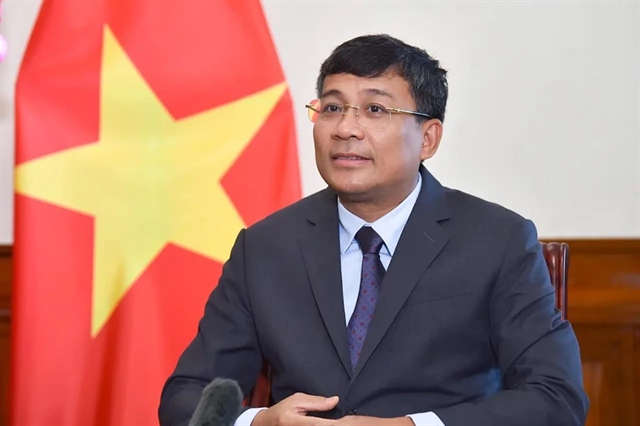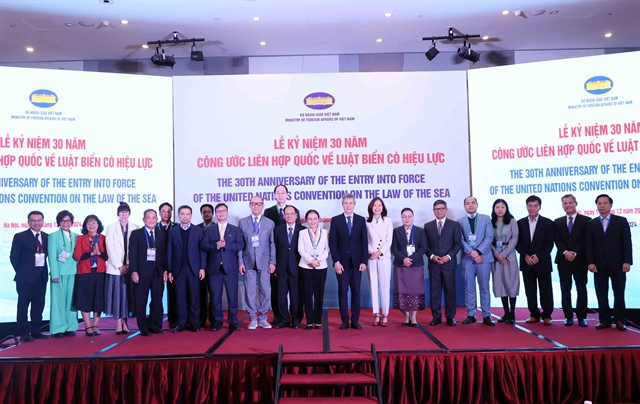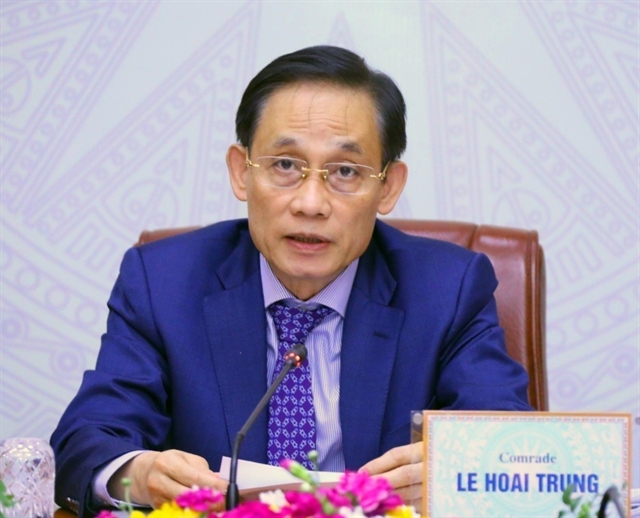 Politics & Law
Politics & Law

 |
| Delegates participating at the 30th anniversary of the entry into force of the 1982 UNCLOS held on December 10, 2024, in Hà Nội. — VNA/VNS Photo |
HÀ NỘI — The Ministry of Foreign Affairs hosted a ceremony in Hà Nội on Tuesday commemorating the 30th anniversary of the 1982 United Nations Convention on the Law of the Sea (UNCLOS) entering into force.
The event aimed to reflect on the value and significance of the convention and review Việt Nam's journey in implementing its provisions over the past three decades.
Speaking at the event, Assistant Minister of Foreign Affairs Nguyễn Minh Vũ said that three decades ago, on November 16, 1994, UNCLOS, the legal framework governing activities on oceans and seas, which cover over 70 per cent of Earth's surface, officially came into effect.
UNCLOS, hailed as 'Constitution for the Oceans,' has established a comprehensive international legal framework governing the rights and obligations of all nations, regardless of geographical or maritime status, in using and managing marine resources sustainably.
The convention has ensured equitable and sustainable exploitation of these resources, while mandating responsibilities to protect the marine environment, preserve biodiversity and balance coastal state sovereignty with the need for scientific cooperation and knowledge expansion, he noted.
UNCLOS provides the foundation for defining maritime zones and delineating sovereignty, sovereign rights and jurisdiction over the seas. It also includes mechanisms for dispute resolution to address conflicts arising from the interpretation and application of its provisions.
Decisions made by judicial bodies established under UNCLOS have further clarified its provisions, ensuring its integrity and effective implementation, Vũ said.
The diplomat said that while the 21st century has brought new challenges, including climate change's adverse effects on oceans, rising sea levels, coastal erosion and technological advancements in maritime activities, UNCLOS remains a robust legal framework, demonstrating flexibility and adaptability in addressing these pressing issues.
Institutions established under the convention, such as the Meeting of States Parties to the Convention, the International Tribunal for the Law of the Sea and the International Seabed Authority, have played proactive roles in addressing emerging challenges to marine governance.
Today, with 170 member states, UNCLOS stands as one of the most significant legal achievements of the international community in the 20th century.
As a coastal nation with over 3,260km of coastline and numerous islands, including the Hoàng Sa (Paracel) and Trường Sa (Spratly) archipelagos, Việt Nam recognises the critical importance of the sea for the country's peace, security and development.
"Full and responsible respect for and implementation of UNCLOS provisions aligns fully with Việt Nam's longstanding principles and policies," the Assistant Minister said.
The Vietnamese National Assembly’s resolution ratifying UNCLOS in 1994 underscored the nation’s commitment to building a fair maritime order and promoting development and cooperation in conjunction with the international community.
Over the years, Việt Nam has systematically improved its legal framework for maritime affairs, including the 2012 Law of the Sea, and developed strategies for sustainable marine economic development. Việt Nam has also defined its maritime zones and boundaries and managed and exploited its marine resources based on UNCLOS provisions.
Resolution 36 of the 12th Party Central Committee in 2018, concerning Việt Nam's Strategy for Sustainable Marine Economic Development to 2030, with a vision towards 2045, outlined the goal of "Making Việt Nam a strong maritime nation."
It set tasks to "enhance international cooperation" in maritime areas and to "actively resolve disputes and disagreements in the East Sea (known internationally as the South China Sea) peacefully, based on international law, especially the 1982 UNCLOS."
The Political Report of the 13th National Congress of the Communist Party of Việt Nam reiterated the commitment to resolving maritime issues based on international law, particularly UNCLOS. The convention is the only international treaty explicitly named and mentioned three times in the report, underscoring the convention’s importance to Việt Nam's security and development.
The diplomat noted that Việt Nam has made significant strides in maritime dispute resolution with its neighbouring countries, including resolving maritime delimitation in the Gulf of Thailand with Thailand in 1997 (the first ASEAN maritime delimitation agreement post-UNCLOS enforcement), reaching maritime delimitation agreements with China for the Gulf of Tonkin in 2000 and the delimitation of the continental shelf and exclusive economic zone with Indonesia in 2003 and 2022.
Việt Nam actively participates in international and regional forums related to oceans and the law of the sea, contributing initiatives that are widely recognised by the global community. It has also sent highly qualified experts to serve in UNCLOS-established institutions.
At the UN, Việt Nam co-founded the Group of Friends of UNCLOS with 11 other countries, a coalition that now includes over 100 members advocating for the Convention's effective implementation, Vũ said.
Regarding dispute resolution mechanisms under UNCLOS, Dr Ximena Hinrichs, Registrar of the International Tribunal for the Law of the Sea (ITLOS) and Neil Nucup, Representative of the Permanent Court of Arbitration (PCA) in Việt Nam, introduced these mechanisms under the convention. They highlighted the roles of institutions such as ITLOS and PCA in resolving international disputes and in interpreting and applying the convention. — VNS




